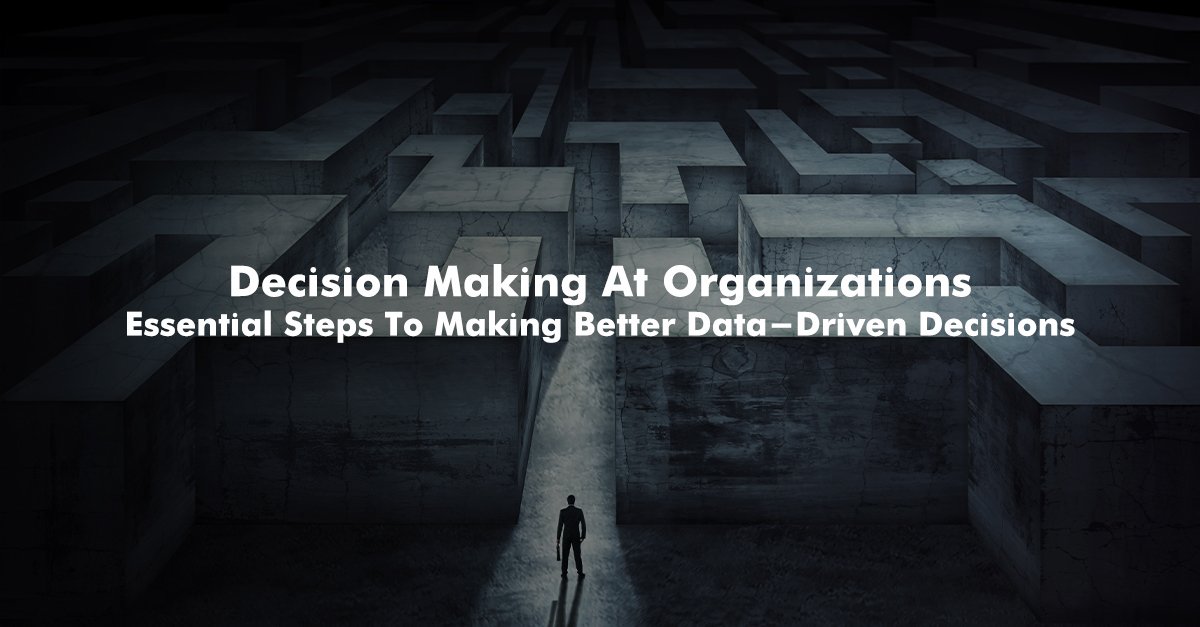
Decision Making At Organizations Essential Steps to Making Better Data-Driven Decisions
“Due to the uncertainties COVID-19 pandemic has presented, making business decisions entirely based on the instincts is not profitable anymore to remain competitive in the market rather the focus is shifting towards data-driven decision making”.
The emergence of the COVID-19 pandemic has not only changed the way businesses work and has also shifted the business decision-making process.
These days, everything is data. Data governs everything from the videos we watch, the content we read, social media posts we see, etc. The COVID-19 pandemic has resulted in the Industrial Revolution 4.0, the Digital Revolution. It is giving rise to digitization, making business practices go digital.
Digitization of business practices has led to a robust significance of data in the present time and the days to come, governing and making data-driven decisions and not entirely based on instincts.
Data-Driven Decision Making: Organizations’ Backbone To Decision Making
Human minds are so hardwired that they tend to make decisions based on unconscious and instincts at times. But when it comes to data-driven decision-making, the game changes entirely. We refer to it as DDDM or data-driven decision-making that uses a given set of information to analyze previous trends. Also make decisions for the future based on past information rather than making decisions based on instincts, experience, and opinions.
A recent research study suggests that 91% of companies report data-driven decision-making as an essential factor in their business growth, while only 57% of companies report it as a basis on which they make decisions.
Many organizations have already started investing in digital tools that aid in data-driven decision-making, making business practices agile and enabling organizations to make business decisions based on actionable insights.
Organizations collect data as datasets, store them in a database, and analyze them in dashboards to reach data-driven decision-making.
However, making data-driven decisions is not as easy as it looks as it involves many things that need to be scrutinized before the implementation, as ineffective decision-making is potential enough to knock down an entire business practice.
Steps to Making Better Data-Driven Decision Making:
Unbiased Decision Making:
Most of the decision-makers in the organizations take decisions based on the human mind.
These decisions are usually from unconscious thinking, gut feeling, instincts, and intuition, making it challenging to verify logic.
Such decisions are often biased as they vary from personnel to personnel.
Such instincts-based decisions are pretty subjective and anything subjective is bound to change, and cannot be entirely reliable for making well-informed decisions for the smooth functioning of business practices.
A recent survey shows that organizations that invested in data-driven decision-making, focussing on reducing the effect of bias in their decision-making processes, achieved returns up to 7% higher.
Gathering the data and defining the objectives:
However, having a large chunk of data is not enough to make business decisions. After gathering data, defining the objectives of the business analysis, comes as the next step to make clearly defined data-driven decisions.
In this way, a massive analysis based on data leads to a more unique and actionable business decision.
Analyzing the Right Data:
Just gathering a large chunk of datasets is not enough.
The onus lies in how well the organizations analyze this gathered large chunk of data.
The process lies in refining the correct data, understanding it, and analyzing it to reach actionable insights to make data-driven decisions by extracting meaningful insights and analytical reports that will make data-driven business decisions.
However, the above-discussed essential steps come with a plethora of risks associated with them.
Risks Associated with DDDM:
Data Quality:
Be it qualitative data, the data collected through observations, or quantitative data; which deals with number-crunching, statistical models, and earlier trends, the risk is always there.
Data gathering is as good as data analyzing as a part of data analytics and not ending up as a part of the data warehouse.
Clueless Focus on Data:
Just focusing on previous trends, given data, and making decisions will hamper the entire business practices.
Focussing only on data is like performing analysis entirely in one format, waiting for the results to come out. Therefore, it ultimately leads to the downfall of the entire process.
If you are always looking behind you, there is a real chance of missing what is in front; making decisions based on the previous records and trends will result in a clueless outcome.
Biased Opinions:
While personnel makes decisions based on past trends, many personnel make decisions based on their instincts. Going entirely by instinct results in cognitive biases, which leads to biased decision-making, while going entirely by the data-driven decision will lead to an automated decision that might not always be right.
Therefore, making decisions based on the expertise of the personnel, using the given set of information; deriving from the given set of data is what results in effective unbiased decision making.
Conclusion:
In the COVID-19 pandemic days and post COVID-19 pandemic days, the significance of data, Big Data, AI, and other emerging technologies is only going to increase.
Data-driven decision-making will become even more critical than ever before in the Fourth Industrial Revolution age in this digital world.
Finally, the organizations will focus on data-driven decision-making entirely. And also, the personnel expertise to avoid any forthcoming error that may result in biased business decisions.
Data and Data Science is here to stay; and the more the organizations focus on data-driven decision-making, the more the business practices will prosper in the upcoming days.





